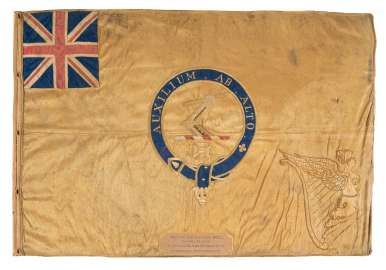National Museum of the Royal Navy fights to save polar sledge flag used in hunt for Franklin’s doomed expedition
- View news filtered by: Napoleonic
- View news filtered by: Navy Organisation
- View news filtered by: Units & Squadrons
- View news filtered by type: Press Release

The National Museum of the Royal Navy has stepped forward in a last-ditch attempt to save the sledge flag used in the search for Franklin and the crews of HMS Erebus and HMS Terror from leaving the UK and into the hands of a private buyer.
Well-known TV documentary presenter and actor Michael Palin, author of 'Erebus, The Story of a Ship' said:
“I wish the campaign to save the Kellett polar sledge flag all the very best. It is an important reminder that men were prepared to put their own lives at risk to try and locate any evidence of the fate of Franklin’s expedition. The Kellett sledge flag is an emblem of survival and heroism in the most appalling circumstances. It is an inspirational piece of naval history and should be kept for all to see so that the story of the brave men who flew it is never forgotten."
Dan Snow, historian and broadcaster said:
“This flag is less instantly familiar than a mighty battle ensign of a ship of the line but it is just as important to our naval story. It’s a flag carried by brave men who put their duty to others above their own self-interest. It's a flag that's been taken to some of the most remote places on earth, fluttering away above a hardy little team, reminding those men that no matter how lonely they felt they were part of something much bigger. This flag is a part of our national story and it should be here for us all to learn from and be inspired by.”
At the time the Government imposed the export bar to save this symbol Arts Minister Lord Parkinson of Whitley Bay said:
"This flag serves as a reminder of Britain’s rich maritime history, helping to tell the story of early British sailors and their travels in search of new places. Its cultural and historical significance should be a driving force to keep it in the country. I hope a buyer comes forward for this treasure soon."
This sledge flag was flown by Captain Henry Kellett during the third of a series of expeditions (1852 – 54) from the eastern side of Canada to look for survivors, or evidence of bodies. Kellett was captain of HMS Resolute, the ship whose own fate strengthened the bond between Britain and the United States.
Chairman of The Reviewing Committee on the Export of Works of Art and Objects of Cultural Interest (RCEWA), Sir Hayden Phillips, commented:
"Resolute had to be abandoned but was recovered and restored by the US Government and presented to Queen Victoria. She then ordered the crafting from its oak timbers an ornate desk which She presented to the President of the United States. This sledge flag, of unique design, is redolent with our history and should live here."
Mystery surrounding the fate of the Franklin expedition and the 129 crew, ignited public debate and intrigue for decades until the discovery of his two ships, HMS Erebus in 2014 and HMS Terror in 2016. Franklin’s failed expedition takes on a symbolic place within Arctic exploration, especially within Britain and Canada, leading to the successful mapping of the Canadian archipelago and northern mainland coastline.
Professor Neil Arnold, Director of The Polar Museum which is supportive of the campaign, remarks:
"The search was enormously significant in public life in Britain in the mid-nineteenth century and was followed closely in the national and international press. While participating in the search efforts, Captain Kellett sighted lands that had not previously been mapped by European explorers, including Herald Island."
Sledge flags were used on polar voyages by British explorers charting the Northwest Passage, the sea route from the Atlantic Ocean to the Pacific Ocean which had become a focus for British science, trade and geographical exploration, representing centuries of efforts of discovery across the globe – it became known as the Holy Grail of exploration.
Professor Dominic Tweddle, Director General of The National Museum of the Royal Navy said:
"Sledge flags were a peculiarly British phenomenon, grounded in a mediaeval chivalry, where these officers were new knights in a new field of combat. Sledge flags contain a lot of iconography, telling the viewer what was felt to be important in the imagery used about that person’s life. With so few known to have survived and in public collections, the Kellett sledge flag takes on a greater significance, and will complement the objects we will soon be receiving from the wrecks of HMS Erebus and HMS Terror, from Parks Canada."
NMRN has a track record of leading the efforts to save national treasures from leaving our shores. Treasures that represent Britain’s proud maritime heritage and the bravery of those that served.
We are proud to once again to step forward and save this astonishing icon that symbolises not only the fortitude of those that sought to bring home Franklin and his 129 men but also Britain’s role in global exploration and expedition.
There are now two weeks left to raise £120,000 and save the sledge flag. NMRN is grateful to the Art Fund for their grant of £40K and is delighted to have secured £10K from a number of private UK and US donors. With the commitment from our ring-fenced Purchase of Exhibits fund we now need to raise the remaining £30K to prevent the Flag from going abroad.
Donations can be made directly by visiting donate.nmrn.org.uk
Alternatively if you would like to discuss your donation in person please email Helen McKenna Aspell at fundraising@nmrn.org.uk